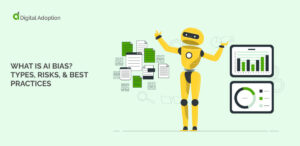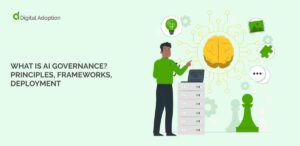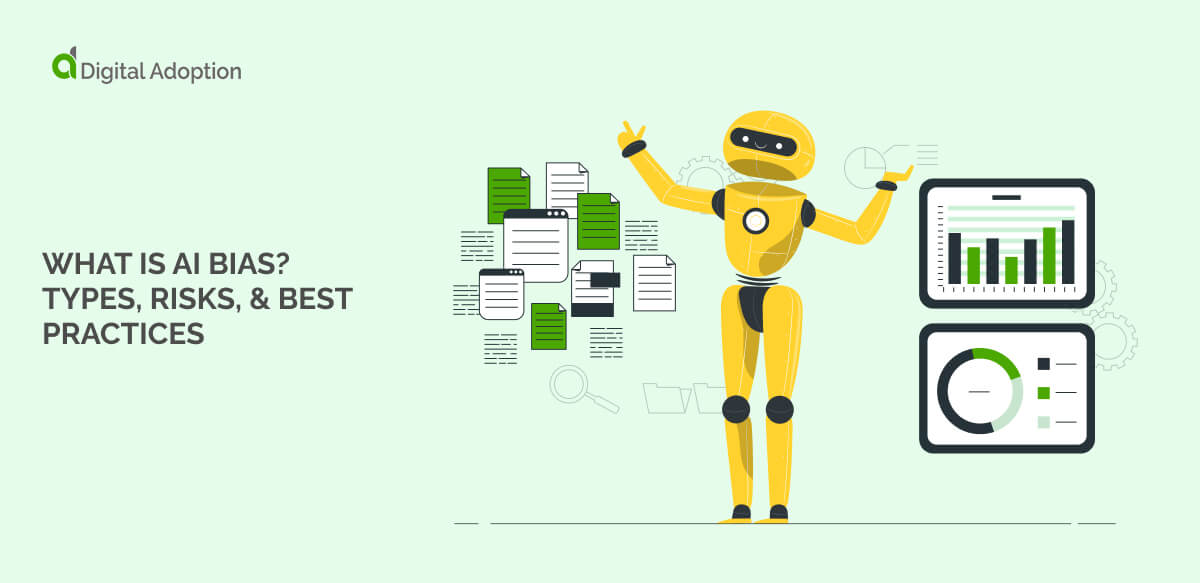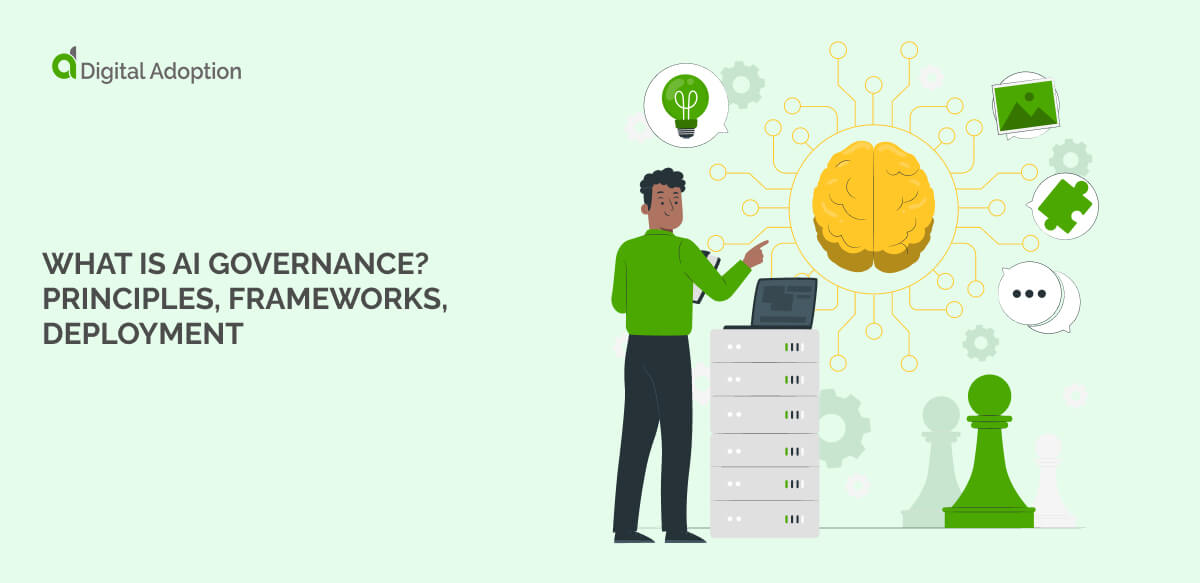You probably know by now that digital transformation is no longer a choice but a necessity for companies looking to stay competitive.
As organizations navigate the complex journey of integrating digital technology investments into all business areas, having the right skills becomes paramount. These skills facilitate the seamless adoption of new technologies and help drive measurable business value from these efforts.
To effectively drive digital transformation projects, one must possess a mix of technical and soft skills.
However, simply possessing these skills isn’t enough. Companies must also invest in training and development programs to ensure their teams have the necessary competencies. This might involve partnering with external experts or leveraging online learning platforms.
Moreover, it’s essential to foster a culture that encourages innovation and risk-taking. If employees are afraid of making mistakes, they’re less likely to experiment with new ideas – something that’s crucial for successful digital transformation. After all, through trial and error, companies can discover the most effective ways to leverage digital technologies and deliver measurable business value.
This article will explore ten critical digital transformation skills that can propel your business toward success. We delve into both technical and soft skills, shedding light on their importance and how they can be nurtured within your organization.
Whether you’re a technology leader, a C-suite executive, or an aspiring digital transformation champion, this insight could be the key to unlocking your company’s digital potential.
10 Skills Your Business Needs to Drive Digital Transformation
If you want to drive digital transformation, there’s no one-size-fits-all solution. Instead, it’s essential to ensure your team members possess a mix of technical and soft skills relevant to the nature of your business.
The following ten skills are a great starting point in building an effective digital transformation team:
1. Digital Literacy

Digital literacy, within the scope of digital transformation skills, implies a comprehensive understanding and aptitude for utilizing digital technologies. This encompasses technical proficiency in areas like cloud computing, cybersecurity, data analytics, artificial intelligence (AI), and machine learning (ML).
These skills are crucial for navigating and manipulating complex digital platforms and tools. For instance, data literacy, a subset of digital literacy, is essential for interpreting and analyzing large volumes of data generated through digital operations. Similarly, understanding AI and ML can enable the automation of routine tasks, enhancing efficiency and productivity.
According to a recent study conducted by the National Skills Coalition, one-third of workers in the United States lack essential digital skills. More specifically, 13 percent of workers have no digital skills whatsoever, while 18 percent possess only minimal proficiency in this area. This underscores the urgent requirement to bolster digital literacy nationwide, guaranteeing individuals possess the essential skills to flourish in our progressively digital era.
Digital literacy also includes proficiency in digital communication and collaboration tools, vital for remote and hybrid work environments. Understanding cybersecurity principles is another critical aspect, ensuring the protection of sensitive data during digital interactions.
2. Data & Digital Security
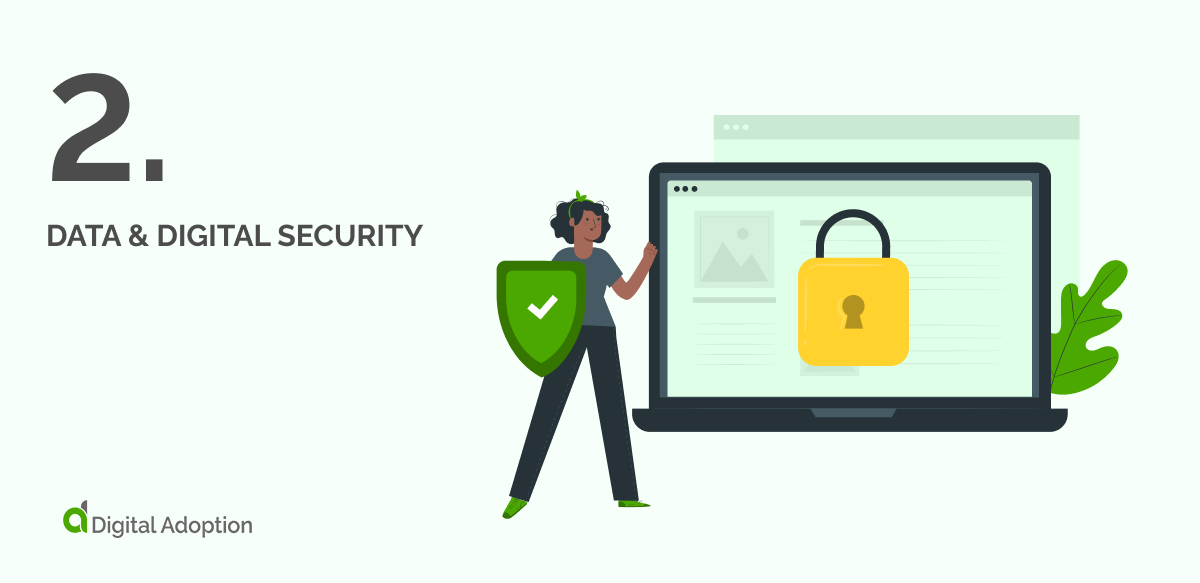
In the digital epoch, data security and cybersecurity have emerged as paramount competencies within the domain of digital transformation. The rapid proliferation of data generation and digital technologies necessitates an organizational prerogative toward the protection of data and fortification against cyber threats.
Data security pertains to implementing efficacious measures to shield critical information from potential compromise, corruption, or loss. It extends beyond installing firewalls or antivirus software; it encapsulates the comprehension of potential threats, risk management, and formulating robust policies and procedures for data manipulation and storage.
Cybersecurity involves safeguarding an organization’s IT infrastructure from various cyber threats. This necessitates proficiency in network security, incident response, and secure coding practices. Rogue IT assets, malicious actors, and insider threats are all security concerns that must be addressed to ensure the safe operation of digital systems.
These skills have become non-negotiable due to the escalation in cybercrime incidents, including data breaches and ransomware attacks.
3. Digital Marketing

Digital marketing is a pivotal skill in the era of digital transformation. As businesses shift to digital platforms, those with a deep understanding of digital marketing are increasingly valuable. This skill set encompasses a broad range of competencies, from SEO and content marketing to social media management and email marketing.
Digital marketing plays a pivotal role as it empowers businesses to connect with their target audience in the most vibrant online spaces where they are actively engaged. It enhances visibility, improves brand recognition, and can lead to higher conversion rates. Digital marketers use data-driven strategies to create personalized campaigns, ensuring each message resonates with its intended audience.
Moreover, digital marketing is cost-effective and efficient, offering measurable results that traditional marketing methods often lack. It provides an equal playing field for businesses of all sizes, fostering healthy competition and innovation. Thus, mastering digital marketing is not just beneficial—it’s essential for companies aiming to thrive in the digital age.
4. Data Analysis
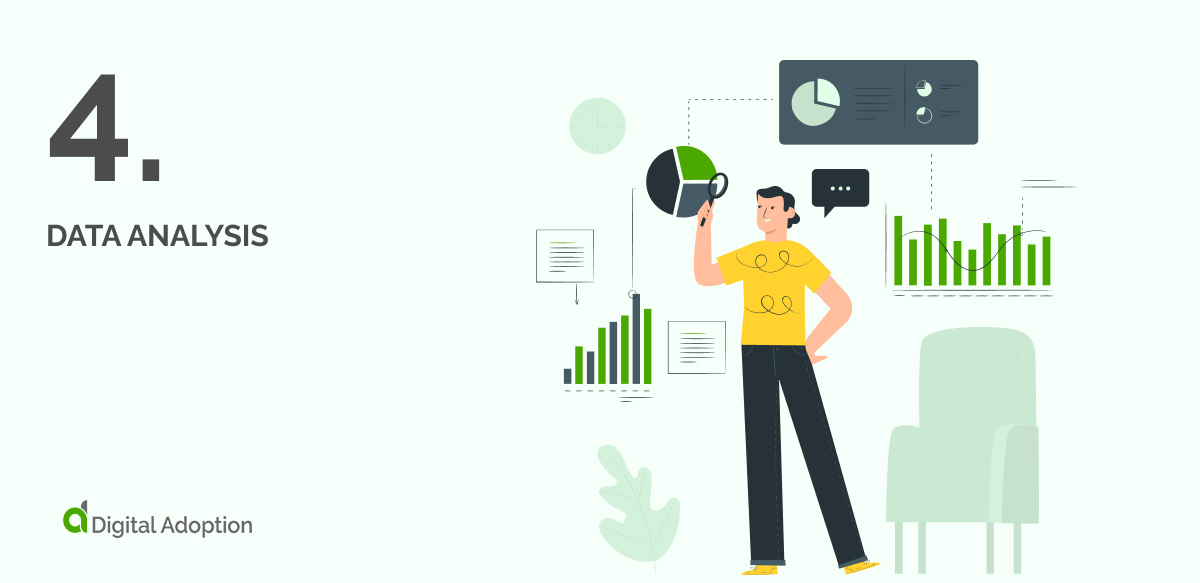
Data analysis is a cornerstone skill in the journey of digital transformation. As businesses increasingly rely on data to drive decisions, professionals adept in data analysis are in high demand.
Data analysis involves interpreting complex datasets to glean actionable insights. These insights can uncover trends, patterns, and correlations that can inform strategic decisions, optimize processes, improve customer experience, and, ultimately, enhance business performance.
In the context of digital transformation, data analysis is particularly valuable. It enables businesses to understand their digital footprint, assess their digital initiatives’ impact, and identify improvement areas. For instance, data analysis can help determine the effectiveness of a digital marketing campaign or the user-friendliness of a digital platform.
Data analysis fosters a culture of evidence-based decision-making, minimizing the need for guesswork. Therefore, data analysis is a crucial skill for digital transformation and a vital competency for businesses striving to excel in the data-driven digital era.
5. Digital Adoption Platform (DAP) Training
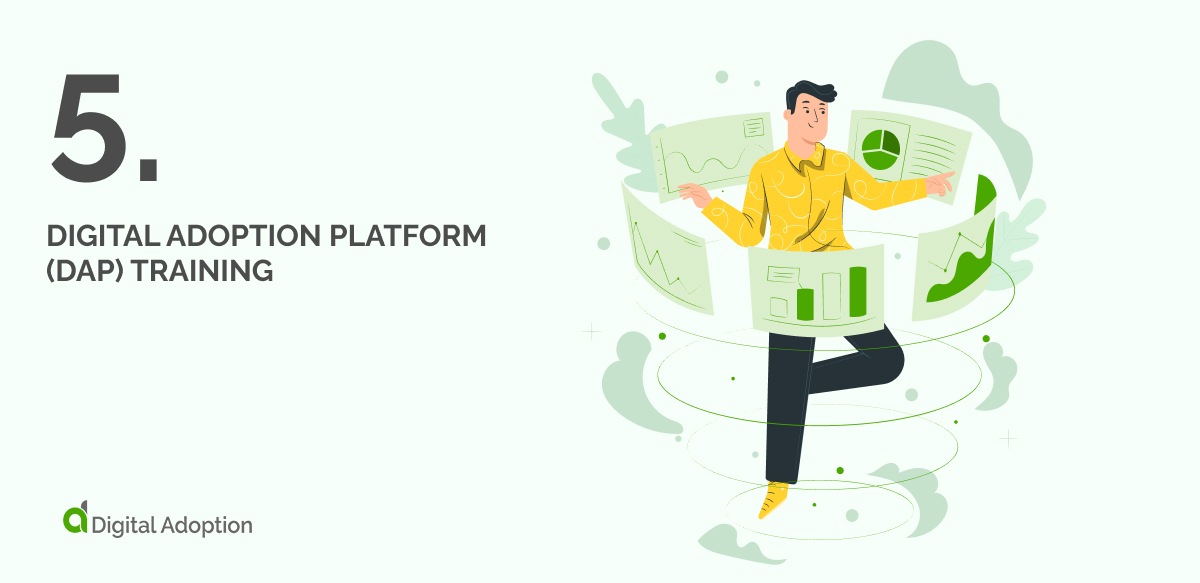
Digital Adoption Platforms (DAPs) are becoming indispensable for modern businesses and employees in their digital transformation journey. They are the foundational cornerstone of successful digital transformation, pivotal in driving efficiency, productivity, and overall business success.
DAPs not only streamline the onboarding process but also enhance the user experience. They offer personalized learning paths and real-time support, reducing the technology adoption curve and empowering employees to use digital tools more effectively. This leads to increased productivity and efficiency, as employees spend less time struggling with new software and more time focusing on their core tasks.
DAPs provide valuable insights into user behavior, allowing businesses to identify gaps in knowledge and address them promptly. This continuous learning approach fosters a culture of digital dexterity, equipping employees with the skills they need to thrive in the digital era.
6. Metaverse

The Metaverse, a concept that envisions a fully immersive digital universe parallel to our physical world, is emerging as a crucial digital transformation skill. With technology giants like Meta (formerly Facebook) investing heavily in building metaverse infrastructure, there’s an increasing demand for professionals adept in this realm. This digital transformation trend is driven by the emergence of virtual and augmented reality technologies, which offer unprecedented opportunities for businesses to engage with customers in a fully immersive digital environment.
In its current iteration, the metaverse didn’t quite win the hearts and minds of the general public, mostly because of its rudimentary offerings. However, the rise of Unreal Engine 5 is expected to change this. The platform promises a visually captivating metaverse experience, allowing users to interact in various virtual worlds.
Understanding the Metaverse requires proficiency in virtual reality (VR), augmented reality (AR), and 3D modeling. These skills are necessary to create and manage virtual environments where users can interact in real-time.
Professionals who can navigate the complexities of the Metaverse will play a pivotal role in shaping this digital frontier. They’ll create novel experiences, from virtual meetings to digital concerts, and even craft entirely new industries. As such, the Metaverse is not just a new platform but is set to become a significant part of the digital transformation landscape.
7. DevOps

DevOps, a combination of ‘development’ and ‘operations,’ is a crucial skill set in the digital transformation landscape. It’s a culture, movement, or practice that emphasizes the collaboration and communication of both software developers and IT professionals while automating the process of software delivery and infrastructure changes.
DevOps aims to establish a high-velocity environment where developing, testing, and releasing software can happen rapidly, frequently, and reliably. This agility allows businesses to serve customers better and compete more effectively in the market.
In the context of digital transformation, DevOps enables continuous integration and continuous delivery, ensuring software can be reliably released at any time. This speeds up the pace of innovation, improves responsiveness to business change, and reduces the risk associated with deploying new features.
DevOps cultivates a culture centered around shared responsibility, collaboration, and transparency, which are vital for a successful digital transformation. Consequently, achieving mastery in DevOps becomes imperative for any business venturing on a digital transformation journey.
8. Enterprise Mobility Management
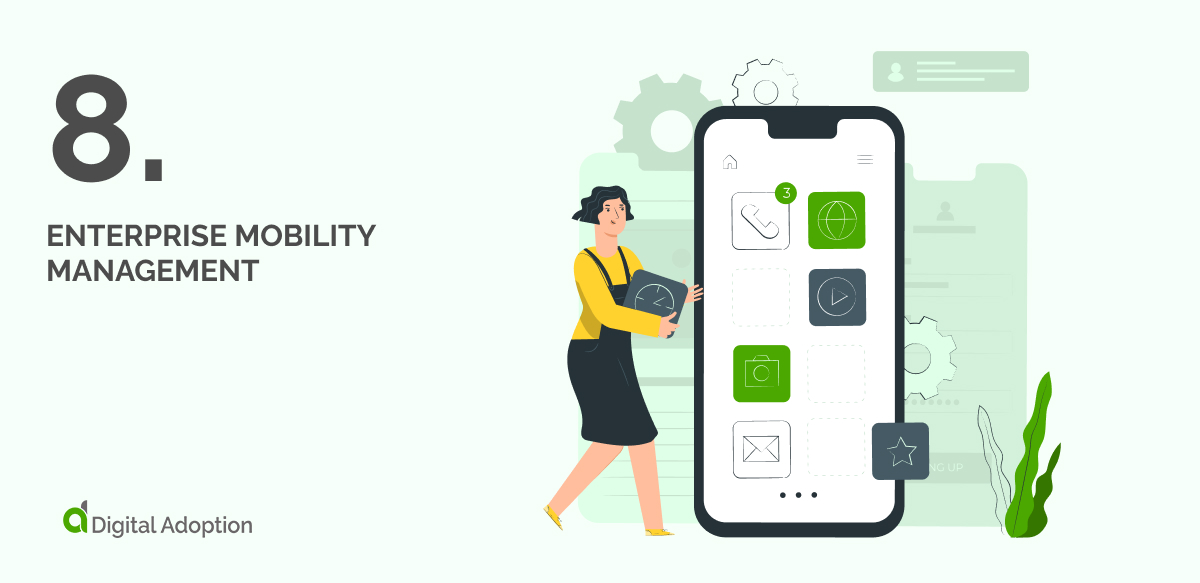
Enterprise Mobility Management (EMM) is a game-changer in the digital transformation landscape. As businesses eagerly embrace mobile solutions, the demand for skilled professionals in EMM skyrockets.
EMM is a suite of policies and tools used to secure corporate data on employees’ mobile devices. It encompasses mobile device management, mobile application management, and mobile content management. Professionals skilled in EMM can ensure secure access to corporate resources, maintain data privacy, and manage software updates across numerous devices.
In the current remote work landscape, Enterprise Mobility Management (EMM) proves to be a revolutionary force that can’t be ignored. It empowers employees to work from anywhere, supercharging productivity while ensuring ironclad security. But that’s not all. EMM is also key to streamlining mobile operations, slashing costs, and unlocking unparalleled efficiency.
In the era of digitalization, mastering EMM skills is essential for effectively managing risks and capitalizing on opportunities in a mobile-first world. EMM is a vital skill for digital transformation and a critical business imperative.
9. Artificial Intelligence, Machine Learning & Robotics
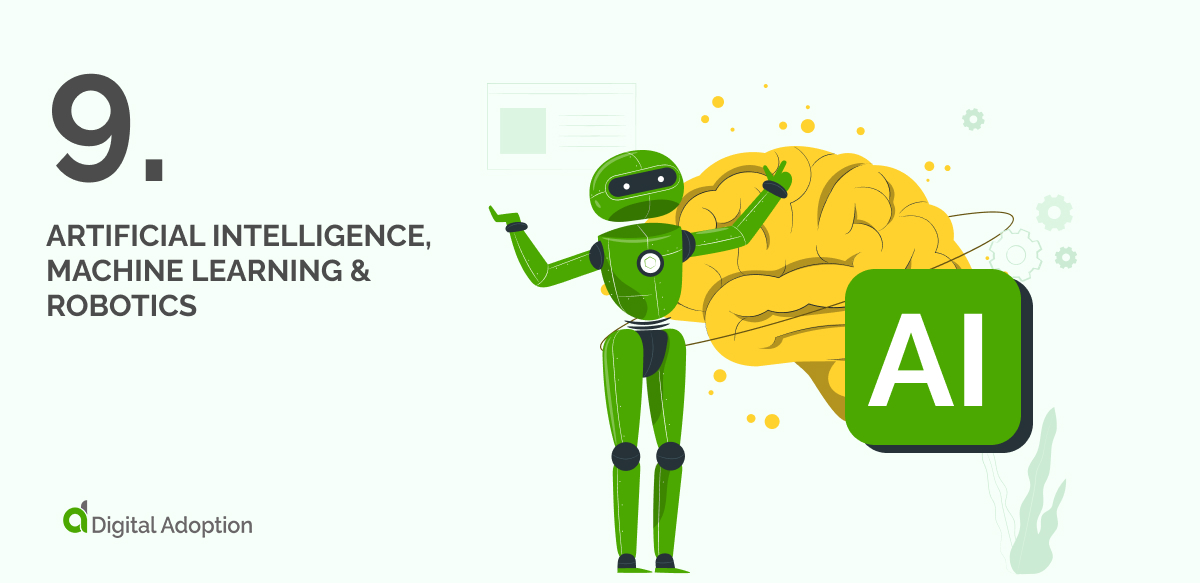
Artificial Intelligence (AI), Machine Learning (ML), and Robotics are the superpowers of digital transformation. As businesses race to automate processes, elevate decision-making, and craft exceptional personalized customer experiences, professionals equipped with these skills are in high demand.
AI and ML are at the forefront of this digital revolution. They enable businesses to interpret vast amounts of data, uncover hidden patterns, and make accurate predictions. This facilitates smarter business decisions, product innovations, and improved operational efficiency. For instance, AI-powered chatbots can offer superior customer service by learning from past interactions and providing tailored responses.
Robotics, on the other hand, transforms physical processes. Robots can perform repetitive tasks more accurately and efficiently than humans, reducing errors and increasing productivity. In the manufacturing, healthcare, and logistics sectors, robotics is revolutionizing how we work.
Together, AI, ML, and Robotics form a powerful trifecta that is shaping the future of digital transformation.
10. Blockchain

Blockchain, the technology underpinning cryptocurrencies like Bitcoin, is fast becoming a vital digital transformation skill. Its potential extends far beyond digital currencies, promising to revolutionize various sectors, from finance and supply chains to healthcare and governance.
Blockchain skills involve understanding how this decentralized, transparent, and secure technology works. It requires proficiency in cryptography, distributed computing, and data structures. Familiarity with programming languages used in blockchain development, such as Solidity for Ethereum, is also crucial.
With blockchain, businesses can streamline operations, enhance transparency, and reduce fraud. For instance, it can enable real-time tracking of goods in a supply chain or instant cross-border payments in finance. Moreover, the rise of blockchain-based applications like smart contracts and decentralized finance (DeFi) underscores its transformative potential.
As businesses explore these opportunities, professionals with blockchain skills will be instrumental in driving this aspect of digital transformation. Hence, acquiring blockchain expertise is a strategic move for future-forward individuals and organizations.
Technical Vs. Soft Skills
In the era of digital transformation, both technical and soft skills play pivotal roles in ensuring the success of a business.
Technical Skills
Technical skills like coding, data analysis, and understanding digital tools and platforms form the backbone of digital transformation. They are the hard skills that enable employees to navigate the complexities of new technologies and implement them effectively within the organization.
Data analytics officers, for example, require proficiency in languages like Python or R to effectively manipulate data and extract valuable insights. Similarly, IT professionals must possess a deep understanding of cloud computing and cybersecurity to safeguard and maintain the company’s digital infrastructure.
Proficiency in technical skills forms the bedrock of digital transformation. These skills empower individuals with the necessary knowledge and abilities to effectively implement, manage, and optimize digital tools and technologies.
Soft Skills
Soft skills are the glue that binds all these technical aspects together. They enable successful navigation of the human element involved in digital transformation.
For instance, applying critical thinking skills empowers teams to analyze and resolve intricate problems that may arise during digital initiatives. In addition, unified communication solutions facilitate the seamless transmission of ideas and strategies, promoting clarity and alignment throughout the organization.
Creativity and collaboration promote innovative thinking and teamwork, which are essential for driving transformational change. Emotional intelligence helps to manage resistance and facilitate change, while adaptability ensures teams can pivot in line with evolving digital trends.
In A Nutshell: Technical skills provide the tools for digital transformation, while soft skills facilitate the effective application of these tools. Together, they create a powerful synergy that accelerates digital transformation, enabling organizations to thrive in an increasingly digital world.
Drive Business Success With Digital Transformation
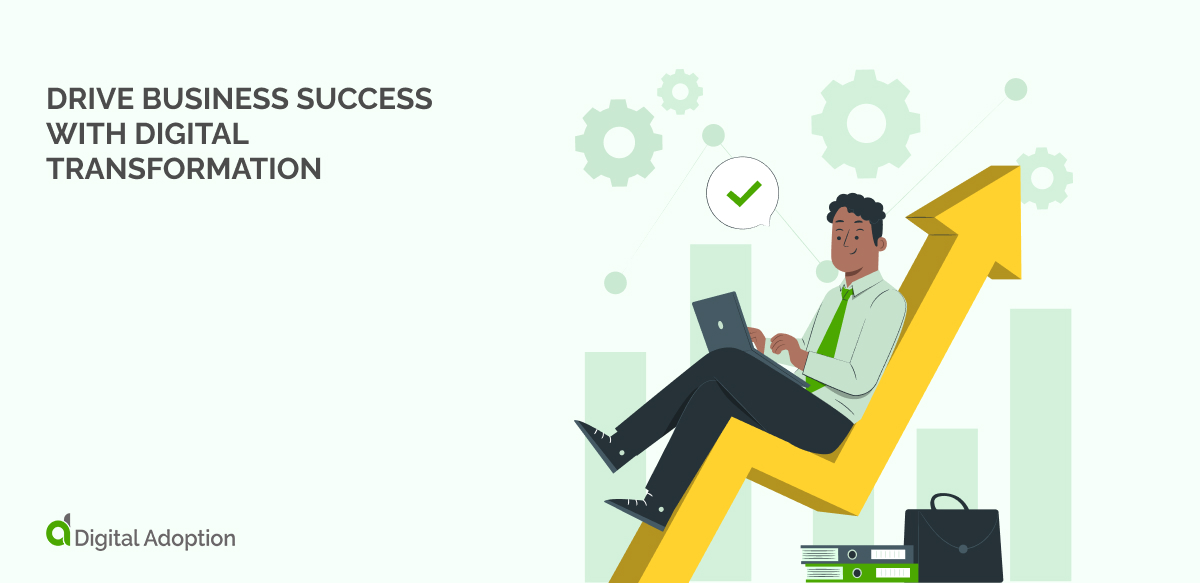
Digital transformation is intrinsically linked with technological innovation. Skills in areas such as cloud computing, artificial intelligence (AI), machine learning (ML), and data analytics allow businesses to harness these technologies’ potential, optimizing operations and driving competitive advantage.
The shift towards a digital-first customer experience necessitates proficiency in user experience (UX) design, customer journey mapping, and digital marketing. Mastering these skills enables businesses to deliver seamless, personalized experiences across various digital touchpoints, thereby enhancing customer satisfaction and loyalty.
Digital transformation also entails a significant cultural shift within organizations. This requires change management and leadership skills to drive a culture of continuous innovation, agility, and adaptability. These skills help businesses effectively transition towards a digital-centric operational model.
Lastly, the increasing reliance on digital platforms has escalated cybersecurity risks. Hence, cybersecurity, data privacy, and compliance skills are crucial to safeguarding sensitive business and customer data against potential threats.
Having a comprehensive set of skills is crucial to make digital transformation work. Check out our comprehensive digital transformation roadmap to kickstart your journey.
Remember, with the right skills. You can unlock digital transformation opportunities and drive business success.





